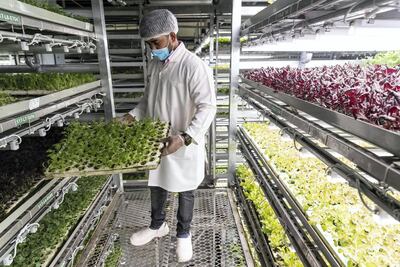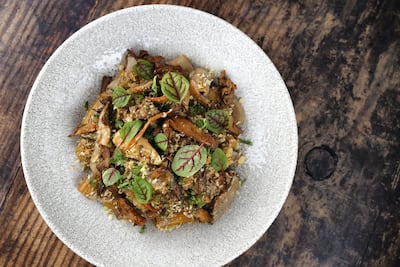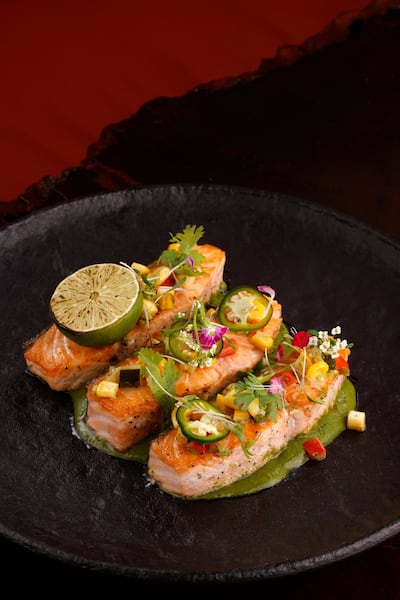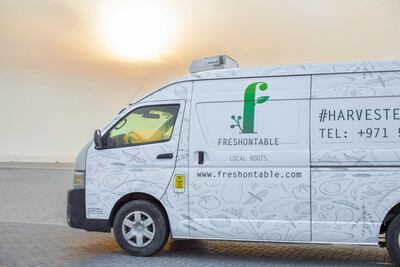The concept of a “farm tour” is not what it once was.
Instead of the smell of open mud and fertiliser that I used to equate with a farm, I'm standing inside a pristine, temperature-controlled room that has rows of herbs and leafy greens stretching out to the ceiling.
I am at Oasis Greens, one of many hydroponic, vertical farms to have cropped up in Dubai over the past few years. In this high-tech environment, seeds are planted into foam, which is placed in a solution that provides plants with all the nutrients they need, while LED lights overhead mimic the rays of the sun.
The process involves no messy soil or pests and, by default, no need for pesticides either, while 90 per cent less water is used than required by traditional farms. The result is sustainably grown local produce – from varieties of lettuce (be it butterheads and icebergs) to kale, rocket and bok choy.
Why buy UAE-grown fruits and veggies?
Whether it’s a hydroponic or traditional farm, there are indisputable benefits of opting for local over imported produce, which is being noticed by both consumers and big brands.
Among the latter is Atlantis, The Palm, which has launched a sustainability initiative titled the Atlantis Atlas Project.
One of the cornerstones of this campaign is a pledge to give diners access to dishes that are made with locally sourced and organic ingredients, grown and harvested in the UAE. Kelly Timmins, director of conservation, education and corporate social responsibility at the hotel, says the reason for this is two-fold.
“One of the key focuses for Atlantis is to look at increasing our use of local suppliers and vendors as part of our commitment to drive the whole local economy."
She says using local produce is better for the environment as it reduces freight and the carbon footprint involved with bringing in goods from across the world.

“We are trying to see how we can source perishable products responsibly. Sustainability is a journey and to get there we need the involvement of our community,” she explains.
To procure fresh ingredients on a daily basis, Atlantis, The Palm has collaborated with Fresh on Table, which works as a facilitator between UAE farms and consumers. The company, which launched in Dubai in 2019, takes orders from hotels, stores and customers online, and co-ordinates with farms to ensure that the product is harvested, packaged and delivered the next day.
According to commercial manager Garima Gambhir, Fresh on Table has grown month-on-month, and currently works with more than 1,000 farms, as well as big hotel groups.
“Chefs realise that local produce is just fresher and going to last longer on the shelf, as opposed to something that has, say, been imported from [the Netherlands] and passed through three days of transit before reaching the kitchen,” she says.
The pandemic has also had an invariable role to play in the rising demand for local produce.
“When borders and hotels started closing last year, the supply food chain was disrupted. With distributors unable to fulfil contracts from international suppliers, we were able to pitch in because everything was local, reliable, and could be picked up from a farm and delivered in a few hours,” says Gambhir.

Local farms have also witnessed a spike in demand over the past year. Nikita Patel, founder of Oasis Greens, says despite the pandemic, business has been good, with a notable rise in online orders.
“Everyone has been at home, cooking. And even though we didn’t have a lot of tourists come in, residents weren’t leaving, either,” she says.
“I think the pandemic made people realise that food security isn’t a theoretical thing. In a lot of countries, people were having issues with grocery items running out, but the UAE did a very good job ensuring that didn’t happen. Over the past year, more companies are looking inwards and seeing how they can source local. We are just riding the wave.”
Hydroponic farms in the UAE

Oasis Greens grows about 12 to 15 types of herbs and leafy greens, and has started cultivating microgreens. "The aim is to get into fruits and vegetables, too," says Patel. "We want to grow cherry tomatoes, chillies and more."
Within the industrial area of Al Quoz, meanwhile, grows one of the largest, most lush indoor vertical farms in the region. UNS Farms is home to 16 varieties of leafy greens and 16 varieties of micro greens across a space of 5,600 square metres.
During a tour, executive director Mehlam Murtaza asks us to dip our feet in a solution to ensure we don't track any crop-destroying bacteria or germs inside, before explaining how different elements can affect the growth of plants.
“Our LED lights are a custom design with a special spectrum. Each colour actually has a different effect on the crop – they can widen the leaf size, make them longer or have another indirect effect,” he says.
The nutritional value of the plant remains unchanged, though, with a lot depending on the quality of the seeds used. The seed also plays a role in the taste – at USN Farms, I’m given two types of basil leaves, Thai and Italian. Despite the fact that both varieties are grown in the UAE, the Italian version is subtle in taste and smell, while the Thai is sharper.
“We have just scratched the surface about what we can do,” says Murtaza. In the future, research and development may be able to further tweak the taste of plants, he adds. "Who knows what's next? Maybe cotton-candy-flavoured herbs."
With a number of perks of buying local, it does beg the question: why haven’t hotels been doing this all along?
Murtaza says it’s only in the past couple of years that vertical farms have developed to deal with the volume they need. Even then, the maintenance and power required to run hydroponic farms means only certain crops can be grown at financially feasible rates.
Locally 'farmed' seafood in the UAE

Supporting local goes beyond leafy greens. While the UAE is blessed with an abundance of seafood, there is still a reliance on imports.
That's something home-grown company Fish Farm is aiming to change. Launched in 2013, the company identified the most in-demand fish species being imported, and sought to change this by growing them within the country. It currently produces organic and regular salmon, sea bass, sea bream, yellow tail kingfish and hammour.
"It's all part of building our food security," says Bader bin Mubarak, chief executive of Fish Farms. "At the moment, less than 10 per cent of the fish is locally acquired. We want to be able to cover the entire UAE market."
The company plans on doing this with the help of three facilities: a caged farming facility in Dibba, a hatchery in Umm Al Quwain and a land farming facility in Jebel Ali.
At the facility in Jebel Ali, Mubarak explains how juveniles and eggs were first sourced from different parts of the globe to ensure the right genetics.
"But since then, we have been hatching our own fish eggs," he says. The Fish Farm was the first establishment in the world to grow Atlantic salmon on land, from eggs, Mubarak says.

Business development manager Edmund Broad agrees that it is all about growing and harvesting seafood in the most sustainable manner possible.
“One of the biggest problems with the seafood industry is the pressure it puts on wild fish stocks, through commercial hunting using huge nets. We are a substitute for this. By growing fish on land in a controlled and secure environment, we are not taking anything from the sea. We’re leaving the oceans alone.”
The farm has recreated the ideal environments required by fish, many of which stem from cold-water countries, such as Scotland and Iceland. The fish swim in an area with appropriate salinity, currents, temperature, pH level and even lighting.
“We’ve recreated the ideal marine conditions suitable to each species: the Atlantic for the salmon, the Pacific for the yellow tail kingfish, the Gulf for the hammour and the Mediterranean for the sea bass,” explains Broad.
The farm currently produces 3,000 metric tonnes of fish per year. “By 2030, we want 50 per cent of seafood consumed to be produced within the country,” says Broad.
From farm to table
UAE residents can get a taste of these sustainable and local ingredients in some of the best restaurants in the country. Thanks to its sustainability pledge, nine of Atlantis, The Palm's signature restaurants are serving dishes with ingredients grown and harvested in Dubai.

Guests can tuck into locally produced burrata from Bread Street Kitchen or an organic salmon carpaccio from Seafire Steakhouse. Hakkasan, which is closed until the end of summer, will be offering dim sum with locally hand-picked chestnut mushrooms while Nobu has a crispy hand-picked shiitake mushroom truffle salad.
Ronda Locatelli, The Shore, Wavehouse and White Restaurant are some other restaurants offering dishes with sustainable ingredients.

Raymond Wong, chef de cuisine at Seafire Steakhouse, says the difference between imported and local ingredients is staggering.
“As a chef, an import order is always challenging as you need to place it three to four days in advance for your produce to come in time. But with this initiative, we can order just a day in advance from sustainable farms in Dubai and the produce is as fresh as it can be.”
He hopes this will encourage other restaurants and hotels to follow suit. “I think it will bring a lot of awareness. A lot of people don’t even know we are growing all this on our doorstep.”



















